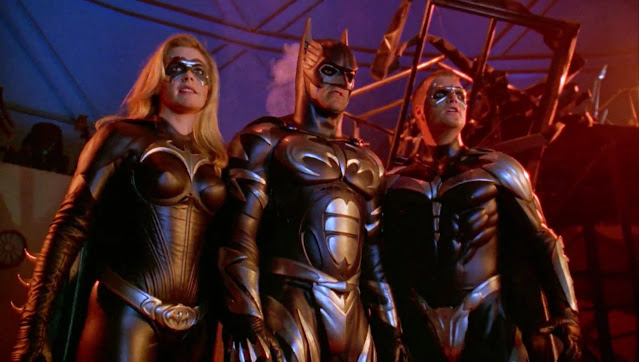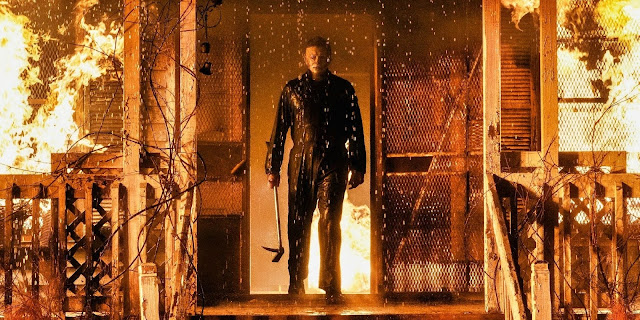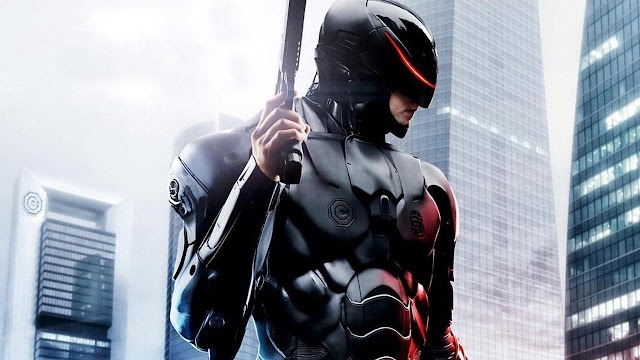- Get link
- X
- Other Apps
Posted by
Christopher Spicer
- Get link
- X
- Other Apps
It was recently reported by Umberto Gonzalez on The Wrap that there is a bidding war between studios that include MGM for the right to produce the next Tomb Raider movie. The big part that stood out to me was that despite Alicia Vikander's version being a modest success in the box office and clearly setting things up for a sequel, the next movie is planned to be a reboot and she will be left out of the series, despite expressing interest in staying involved.
Most know that Vikander's picture was already a reboot after Angeline Jolie starred in two movies based on the hit video game.
Some studio executive decided they want this series to challenge Spider-Man, Batman, Superman, Teenage Mutant Ninja Turtles, and Terminator for the crown of movie series that have been 'reimagined' and rebooted the most.
I initially was just going to slot Spider-Man in that above sentence, but then remembered there have been several Batman versions too, which then got me thinking that Superman has had at least three reboots when not counting anything animated or prior to 1978 as well. Then Google informed me Teenage Mutant Ninja Turtles and Terminator deserve that honour as well, and to be honest, if I just want to 'research' rather than write I can come up with at least five more that have had more than one reboot or remake (James Bond has had many, though we've accepted that as the ;charm' of the series).
And I could craft a giant-slaying tome if we just included every series that had at least one reboot/remake. When it comes to movies made with the intention of sequels or being studio tentpoles, it would save more time just listing the series that somehow avoided ever having a remake.
A series doesn't get to sit at the movie cool table unless it has at least one movie wiping the previous canon clean to start fresh and annoy thousands of fans that were invested.
This is the crazy part of the recent movie studio obsession with just starting fresh with a series that already has a few sequels or clearly set-up a sequel. Unlike the 1980s and 1990s, filmmakers mostly crafted stand-alone pictures with the studio having high expectations it would be a box office hit that they could follow-up with sequels. At least, we usually had a movie with a clear beginning, middle and end that wrapped everything up, and we felt like we got the full story. Studios cared just as much about sequels in the 1980s as they do now, but they were stuck with this silly belief that a movie should be a complete story.
FOOLS!
In what is one of the biggest negatives left by the massive success of the Marvel Cinematic Universe, studios saw the value in teasing more stories and setting up a grander Endgame to payoff everything before it, and hopefully, bring in enough money to buy eight small countries by cultivating a salivating fanbase begging for the big event movie.
So, now almost every first movie drops lots of teases and hints at a grander story, and while a few things are resolved at the end, the viewer leaves the theatre feeling slightly unsatisfied knowing they only got a piece of the story. Many big tentpoles today put a significant focus on setting up future sequels.
The 2018 Tomb Raider starring Alicia Vikander had an ending that was just slightly less blatant than flashing a giant 'To Be Continued' across the screen. A more sinister evil corporation was revealed along with a few motivations for Vikander's Lara Croft to continue her adventuring and solving some more dark mysteries tied to her family. I remember finishing the movie and feeling everything that I saw was just a taster to set-up the real adventure in sequels. While I wasn't huge on the movie, it did have its fans and there were people eager to see where the story would go with the sequels that had been planned, until it was recently announced the next one will be a reboot instead
There must be a point where fans of a series throw up their hands and say, 'That's it! I quit!' because why invest if we're never going to get the payoff, but just a bunch of first installments in a planned series.
The Terminator is proof that this is already happening. The last few pictures have not done well at the box office with the recent Terminator: Dark Fate being a major flop. In a world of Blu-Rays and streaming services, we can always get our killing robot intent on machines ruling the world fix with the original and Terminator 2: Judgement Day. In both cases you get a full and great story that is paid off with no need to wait for sequels to solve major plot points or provide needed answers. Or in what usually happens, make everything more muddled, convoluted, and contradictory.
Most the sequels and reboots were not very good, so that would be a major reason for the diminishing return. But the studios continuing to resort to reboots that wiped out some of the previous canon had to add to the apathy towards the next installment. Terminator: Genisys was a box office disappointment, and one of its biggest issues was that half the movie was about dropping hints and setting up stories for the planned sequels. The movie was borderline incoherent if you tried to follow the story, as it was just a bunch of teases for a future payoff. We never got the payoff because they brought back Linda Hamilton and gave us Dark Fate. This had to be flaming thunder kick to the nose for those fans that were invested in the 2015 reboot, because now all those vague story points will never be resolved.
The constant reboots show studios don't give a damn about story or at satisfying loyal fans with an actual conclusion. Studios are like my kids during Christmas where they bounce around every week on the gift that they absolutely need to fulfill their life. Studios struggle to stick with a direction the moment they discover a shiny new thing or there are signs it may not bring them in a billion dollars. The misguided belief is that intellectual property and the recognizable name is more important than the story they just dropped millions in telling.
Terminator has proven that recognition of characters is not enough to draw out fans, even if some of the initial movies are beloved. The constant rebooting and erasing of past movies have meant that some of the most hardcore fans actively avoid the reboots. Remember 2016 Ghostbusters and how some fans responded to a movie completely wiping out the canon of the past pictures? Studios seem to not grasp that the brand, IP, and franchise doesn't mean anything if there isn't an investment in the story.
Did the 2016 Ghostbusters really need to be a remake? Why couldn't it just have been a group of women that saw the world once had a team of ghost hunters, and they would now take on the mantle. How would it have been received if the original cast played their actual characters like they did in Ghostbusters: Afterlife? I am well-aware some of the backlash came from misogyny and sexism, and the internet sucks if you're not a heterosexual white male most days, but trying to completely remake established canon did not help the movie connecting with fans. Then erasing it again for recent picture helped alienate any new fans that the remake garnered. We could argue a remake does allow for a series to be more accessible to a new generation and young fans, but Force Awakens seemed to do okay without kicking the original trilogy to the curb.
There is something to having recognizable brand (I hate words like this and franchise, but the reality is the remake game is treating movies like product over storytelling and art) that cause a movie to stand-out during an era where we are drowning in entertainment options, but the recognition means nothing when it is the third reboot and fans have been burned twice with stories being tossed aside and characters being completely reimagined.
I understand a part of the thought-process for why studios decide to scrap previous work and start all over again. They have an underperformer in the box office or a movie that did well but was panned by critics and fans like Batman & Robin or The Amazing Spider-Man 2, so they want to take advantage of the popularity of the world and characters by distancing from the latest stink of perceived failure. While Batman Begins and Spider-Man: Homecoming were major hits that breathed life back into a series by taking some fresh and different approaches, most of the remakes alienate invested fan and display a lack of problem solving and creativity.
The 2018 Halloween and the follow-up Halloween Kills were not straight-up sequels, but part of the hottest craze of the reboot strategy. The original of a popular series is what drew in the loyal audience, so must agree there is no reason to tinker with that, but instead the filmmakers craft a sequel that retcons out all the sequels that have been declared unworthy and change the direction of the series. It allows a filmmaker to purge the things the fans moan about without having to find a way to deal with it.
The 2018 Halloween established only original movie ever happened. I will admit that the Laurie Strode is the sister of Michael Myers always felt soap opera-ish and tacked on, especially, since nothing in the original made it seem like he was targeting Laurie for any reason other than he is a ruthless killer. I am sure every Halloween fan ever celebrated when all the cult garbage was erased from memory. We wanted Myers just to be a heartless, unknown killer rather than a mystic avatar for an ill-defined cult.
The retconning has some issues in the storytelling because the new movies rely on the fans' knowledge and investment of the supposedly wiped out sequels for them to really work. Laurie is obsessed with Michael and is convinced that he will return to kill her one day. If you include all the movies where Michael is a relentless predator stalking and pursuing Laurie wherever she goes then that obsessions makes sense, but in the context of only the original existing, Michael had a one night rampages and has been gone for decades. I get Laurie having trauma, but the belief he will return because he is pure evil seems like a leap if we only allow the original to inform how we see Michael. The new movies demand we know Michael is a killing machine based off movies it is also asking us to ignore.
This leads to the even bigger problem with Halloween Kills. You could say that the events of the original made Laurie unhinged, and that is part of what triggered her obsession with Michael and deluded belief that he is destined to go after her again. But we then learn that half the town is obsessed with Michael and speaks about how he terrorized Haddonfield. He is purse evil. And evil dies tonight. Evil dies tonight! Did you know evil dies tonight? Except it doesn't, because there is another sequel coming.
The town believes Michael is the epitome of evil after terrorizing the town for one night. In the context of only the original happening, Michael killed three people that night, and four in his entire life. Killing any number of people is evil. But many small towns have had murders, and they don't think that killer is some mythical boogeyman that is destined to come back to terrorize them again. I assume this movie is set in the real world, where there have been many serial killers, especially in the 1970s and 1980s. The whole subplot of a town obsessed with ending Michael Myers and the fact he has a legacy of evil that relies heavily on what we know about him from sequels that no longer exist in the canon of this specific movie. Filmmakers want us to ignore them, while desperately needing them for the story to connect emotionally.
The now completely erased from canon Halloween: H20 was more effective in 'rebooting' the series. It brought back Laurie by saying she faked her death to escape Michael. It still has the issue of totally erasing her daughter Jamie, but at least still vaguely accepts the past movies to show us Michael has been very busy the past few decades and does have a long history of being obsessed with Laurie. It has more stakes with their confrontation than the new movies, because we can at least use parts of past movies to drive the emotions.
How often are remakes necessary? In most cases, a creative and talented filmmaker and screenwriter could still honour the things in past sequels and veer the movie in a direction that demonstrates the series going in a fresh direction. Afterall, if you go through every MCU movie you'll realize they have done significant retconning throughout and ignored certain story points that no longer work, or they have made significant character tweaks without suddenly wiping out all the things that do work by declaring they are remaking everything.
Storytellers making minor adjustments and ignoring past things that no longer line up is just part of the job. The Star Wars prequels are sandpaper against the non tinkered original trilogy with a revised interpretation what was being established in the previous pictures, or any Stephen King fan knows he has reworked history in previous novel to fit with the new story he is telling. The fans will still scream about those plot holes and contradictions, but isn't that part of the fun. It is what YouTube and podcasts were built on. A few tweaks and ignoring of history are easier to follow then throwing all the past storylines in the dumpster.
This brings us back to the planned Tomb Raider remake. Is Tomb Raider such a beloved series that people are demanding that it is all redone? I'd argue almost no series is popular enough to keep forcing viewers to go through an origin story again. This is the issue with the Tomb Raider remake, as fans will now need to be introduced to a new Lara Croft, get the stakes established once again, recreate this world with new rules, get a history formed to wipe out the previous, and take the time to distinguish how this story is better than the previous two iterations to justify all the effort.
On top of that, if the plan is to set-up more sequels and have a several movie spanning story than the challenge is convincing fans that there will actually be a payoff to their investment of time and money rather than just fearing there will be another remake in 6 years when studios get tired of this version.
They already have a star in Alicia Vikander. They already have a big bad that must be defeated. There are mysteries to be solved that some fans were interested in discovering. Even if studios want to shift the tone or have a new direction, it is a better strategy to be creative and work with what is already established with their loyal audience. Empire Strike Back, Temple of Doom and even Thor: Ragnarok were rather significant shifts from the previous movie, but they didn't outright erase anything. Change can happen and be accepted without burning everything down.
I am not calling for the death of the remake. They work well when you look at an older movie that had a great concept that did not completely work on the big screen. It allows a new filmmaker to approach a failed idea and make something familiar but fresh. In most cases, it is better for the filmmaker to work with the established canon and characters that the audience is already connected with and use some ingenuity and creativity to craft a sequel with a compelling new story that revives a series that is stagnating rather than just starting all over.
What series did you wish got a proper sequels rather than being remade again?
- Get link
- X
- Other Apps
I am a writer, so I write. When I am not writing, I will eat candy, drink beer, and destroy small villages.









Comments
Post a Comment